Cuts put music lessons at risk for all but the wealthy, say teachers

Your support helps us to tell the story
From reproductive rights to climate change to Big Tech, The Independent is on the ground when the story is developing. Whether it's investigating the financials of Elon Musk's pro-Trump PAC or producing our latest documentary, 'The A Word', which shines a light on the American women fighting for reproductive rights, we know how important it is to parse out the facts from the messaging.
At such a critical moment in US history, we need reporters on the ground. Your donation allows us to keep sending journalists to speak to both sides of the story.
The Independent is trusted by Americans across the entire political spectrum. And unlike many other quality news outlets, we choose not to lock Americans out of our reporting and analysis with paywalls. We believe quality journalism should be available to everyone, paid for by those who can afford it.
Your support makes all the difference.Music education will remain the sole preserve of children from well-off families unless the Government pumps more money into the subject, an expert warns today.
Cuts to services will mean parents having to make up the shortfall in budgets, said Virginia Haworth-Galt, chief executive of the Federation of Music Services.
A survey by the FMS's national music participation director, Richard Hall, found that more than one in three (34 per cent) providers of music tuition to schools in England had already issued redundancy notices to staff.
In her first interview since taking up her post, Ms Haworth-Galt said that local authority orchestras and ensembles would be worst affected because they were more likely to be funded by councils, which are bearing the brunt of the Coalition's funding cuts. "In some areas parents are having to step in and pick up the pieces to ensure provision continues. This is one option where there are cuts. It will mean a lack of access to music for those children from low-income backgrounds."
A High Court ruling in 1981 made it illegal to charge for music education. In an attempt to get round this, parents have been asked to make "voluntary contributions". A change in the law in 1987 made it possible to charge for one-to-one music tuition.
The findings of the FMS survey come on the eve of the publication of a government review of music education. Michael Gove, the Education Secretary, asked Darren Henley, head of Classic FM, to carry out the review by the end of this month.
The FMS says music services face "a very perilous situation" if the review does not lead to more cash. A ring-fenced fund of £82m for music education is due to be scrapped at the end of March. A separate £10m fund to buy musical instruments for schools over the past four years is also due to be closed. Mr Gove is known to favour leaving headteachers free to decide how to spend their own budgets, rather than securing cash for particular services.
The FMS says its main concern is that this could prove to be "a very high-risk strategy". "Such a move could jeopardise much of the excellent work that music services undertake and decimate their numbers, as occurred in the early 1990s when music education went into a steep decline," it says. "Quality provision will only be available for those who pay."
Join our commenting forum
Join thought-provoking conversations, follow other Independent readers and see their replies
Comments